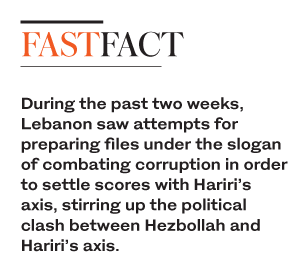Lebanese government faces first public dispute between Future Movement and Hezbollah
BEIRUT: Former Lebanese Prime Minister Fouad Siniora has responded to a campaign launched by Hezbollah accusing him of corruption and demanding that he should be brought to justice.
He said: “The campaign aims to demonize all the governments headed by Rafic Hariri and attack him as well as all the prime ministers who followed him, including Saad Hariri.”
“This campaign against Siniora, and therefore against Hariri’s axis, has commenced before the Special Tribunal for Lebanon issues its ruling on the assassination of former PM Rafic Hariri, which five Hezbollah members are accused of and are escaping from prosecution,” a source close to Siniora said.
Siniora broke his silence in a press conference on Friday, during which he attacked Hezbollah: “The biggest corruption is political corruption, and everyone who establishes smaller states within the state, controls the state’s facilities, disrupts the constitutional deadline, and denies the course of law is politically corrupt.”
He said: “We are looking these days at something similar to what happened during the days of the security regime 20 years ago when I was framed.”
Siniora’s speech reminded the Lebanese people of a campaign launched by the Lebanese-Syrian security regime against Rafic Hariri in 1998-2000.
 This campaign was repeated before the assassination of Rafic Hariri in 2004-2005 and after Israel’s aggression against Lebanon in 2006. The decision issued last week by the Constitutional Council to withdraw the Parliament membership of Future MP Dima Jamali was the first attempt to weaken the parliamentary bloc of PM Saad Harari.
This campaign was repeated before the assassination of Rafic Hariri in 2004-2005 and after Israel’s aggression against Lebanon in 2006. The decision issued last week by the Constitutional Council to withdraw the Parliament membership of Future MP Dima Jamali was the first attempt to weaken the parliamentary bloc of PM Saad Harari.
The campaign against Siniora reached its peak when a Hezbollah MP reopened the file on the $11 billion spent during Siniora’s premiership, a move that the Future Movement described in a statement as paving the way to target Saad Hariri.
Siniora stressed that “the spending, whether from the budget appropriations or the treasury, was not illegal.” He added: “It was fully legal under the acts of Parliament. The spending was subject to the same mechanisms stipulated in the Public Accountancy Act, beginning with the prior and subsequent monitoring and approval of the expenditure controller and the Audit Court.”
He said: “Every disbursement is recorded, audited and available. Expenditures are fully recorded in the records of their ministries, in addition to being recorded in the Ministry of Finance’s records, published on its website.”
He revealed that the amounts Iran said it had paid to Lebanon had not been disclosed to the Lebanese state, and that when he met with Iran’s ambassador to Lebanon more than once during his premiership, he asked the ambassador, but he had refused to say how much had been paid.
Siniora said: “Those who got involved in regional and international conflicts that jeopardized the interests of Lebanon and its people, took the state hostage and exposed it to risks, disrupted institutions and their constitutional deadlines, and interrupted the economic process have no right to hide in their impasse in dust that does not last and which we have enough light to dispel.”
Hezbollah MP Hassan Fadlallah presented financial documents two days ago to the financial prosecutor, Judge Ali Ibrahim, who initiated an investigation by summoning an employee from the Ministry of Finance to listen to her testimony, even though this file has nothing to do with the fight against corruption or financial waste. This file is associated with “zeroing” the state’s financial accounts to allow the government to begin its work and carry out projects by approving the 2019 budget law.
MP Fadlallah said in a press conference at the time: “We want to hear what the judiciary says about those who have manipulated the state’s finances and its financial restrictions.”
Hariri’s Future TV channel launched an attack on Hezbollah on Thursday evening, referring to the corruption and wasted money linked to Hezbollah, from the smuggling operations carried out through the airport, ports and land borders.
They are estimated at billions of dollars, to being behind the production and trafficking of narcotic drugs such as Captagon, and establishing dummy companies registered with guarantor institutions, leading to the loss of billions of dollars in public money.

Lebanon’s Hezbollah suspends official over Parliament spatLebanon marks 14 years since Hariri assassination



